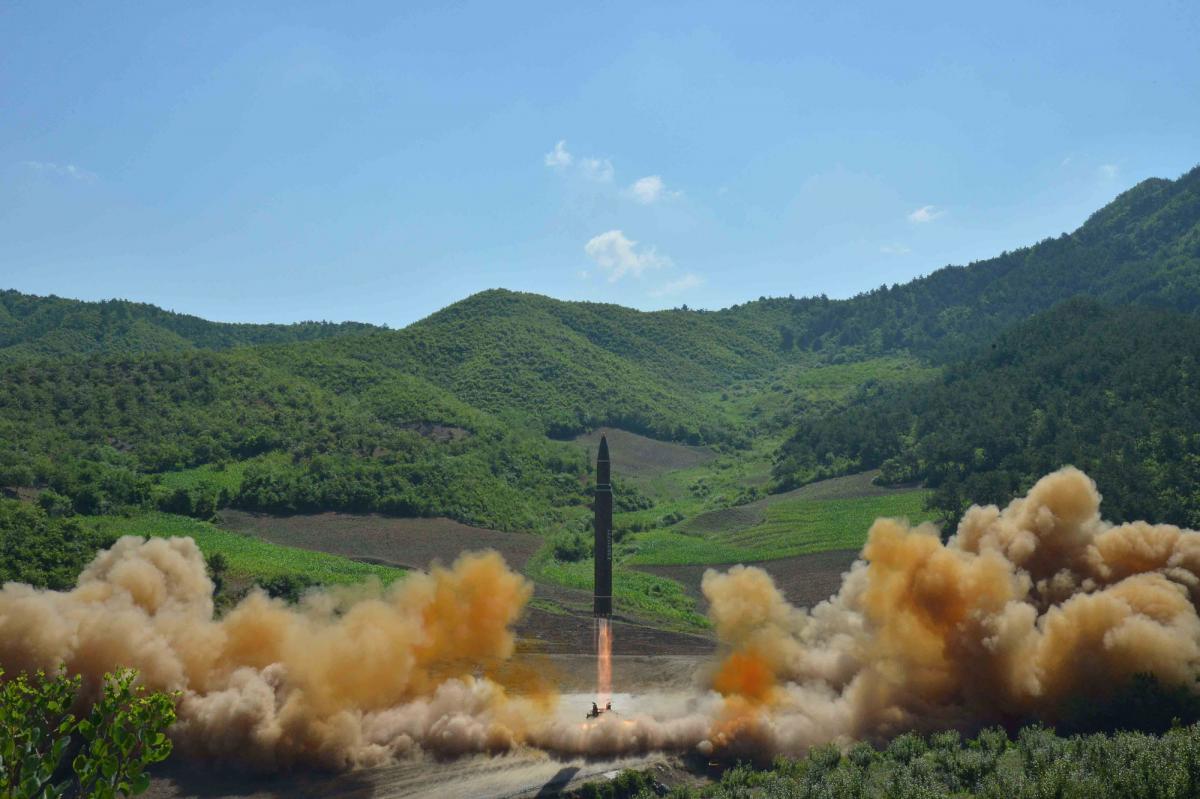
North Korea passed a law Sept. 9 enshrining its right to launch pre-emptive nuclear strikes. According to the official Korea Central New Agency (KCNA), the law states that “if the command and control system of the national nuclear force is in danger of being attacked by hostile forces, the nuclear strike will be carried out automatically and immediately.” The KCNA added that “by promulgating a law on a policy of the nuclear forces, our country’s status as a nuclear-weapons state has become irreversible.” The new law replaces a 2013 law that allowed for the use of nuclear weapons only in retaliation or to repel invasion.
This move appears to rule out any possible negotiations with the South, despite the recent efforts of South Korean President Yoon Suk-Yeol. On Aug. 15, Yoon used his speech marking the 77th Liberation Day (celebrated in both the South and North) to put forth an initiativeoffering a large aid program to the North in exchange for de-nuclearization. Yoon stated that “de-nuclearization of North Korea is essential for sustainable peace on the Korean Peninsula and the world.”
Pyongyang conducted a series of missile tests in 2022, including a suspected ICBM.
From Jurist, Sept. 12. Used with permission.
Photo: MissileThreat





Korea: ‘warning shots’ along disputed sea boundary
North and South Korea exchanged “warning shots” along their disputed western sea boundary—a scene of past bloodshed and naval battles. South Korea’s navy broadcast warnings and fired warning shots to repel a North Korean merchant ship that violated the sea boundary. North Korea’s military said its coastal defense units responded by firing 10 rounds of artillery “warning shots” in its territorial waters, where “naval enemy movement was detected.”
The sea boundary off the Korean Peninsula’s west coast is a source of long-running animosities. The UN command drew a border at the end of the 1950-53 Korean War, but North Korea insists on a boundary that encroaches deeply into waters controlled by the South. Among the deadly events that have happened in the area are the North’ shelling of a South-controlled island and its apparent torpedoing of a South Korean navy ship, both in 2010. The two attacks killed 50 South Koreans. (AP)
Two Koreas exchange missile fire
A North Korean ballistic missile landed less than 60 kilometers off South Korea’s coast on Nov. 3—unprecedentedly close to the South’s claimed waters. South Korea responded with three missile launches of its own. The missile from the North, one of a barrage of some 20 that day, landed south of the Northern Limit Line (NLL), a disputed inter-Korean maritime border. It fell off the South’s port city of Sokcho and triggered air-raid alarms on Ulleungdo island. South Korean President Yoon Suk-yeol called it an “effective act of territorial encroachment.” (Rueters, BBC News) The launches came as the US and South Korea are undertaing their largest ever air drills. (Reuters)
North Korea to no longer pursue reconciliation with South
North Korean leader Kim Jong Un announced Jan. 15 that North Korea will no longer pursue reconciliation with South Korea and called for a constitutional change to identify South Korea as the “number one hostile state,” according to the state-controlled Korean Central News Agency (KCNA). (Jurist)
Russia vetoes renewal of UN panel monitoring North Korea
Russia on March 28 vetoed a UN Security Council resolution to extend the mandate of a panel of experts monitoring North Korea.
The resolution would have extended the mandate of the Panel of Experts assisting the Sanctions Committee on the Democratic People’s Republic of Korea until April 30, 2025. Without the extension, the panel’s “credible, fact-based and independent investigations” of North Korea’s unlawful weapons programs will be blocked, according to the US representative to the UN. (Jurist)
Fear in Japan over threat of North Korean missile
The Japanese prime minister’s office issued an emergency warning through its J-Alert nationwide system May 27, urging residents in southern parts of the country to take cover indoors or in a sheltered area due to the possible threat of a North Korean ballistic missile. North Korea said it ad launched a military spy satellite into orbit. North Korea is barred by United Nations Security Council resolutions from launching such rockets because they use the same technology needed to build intercontinental ballistic missiles. The launch came the same day that China, Japan and South Korea held a trilateral summit in Seoul. (Jurist, NYT, Nikkei Asia)
North Korea agrees to stop launching waste balloons
The Ministry of National Defense of the Democratic People’s Republic of Korea (DPRK) announced June 2 that they would cease sending further waste-carrying balloons to South Korea. The waste balloon assault began on May 28, dropping paper and rubbish into metropolitan areas such as Seoul. The DPRK claims to have sent 15 tons of waste in 3,500 balloons. South Korean media report that the balloons also carried excrement. (Jurist)
Noise versus trash at Korea DMZ
South Korea started loudspeaker broadcasts toward North Korea June a after trash balloons from the North were resumed. (Jurist)